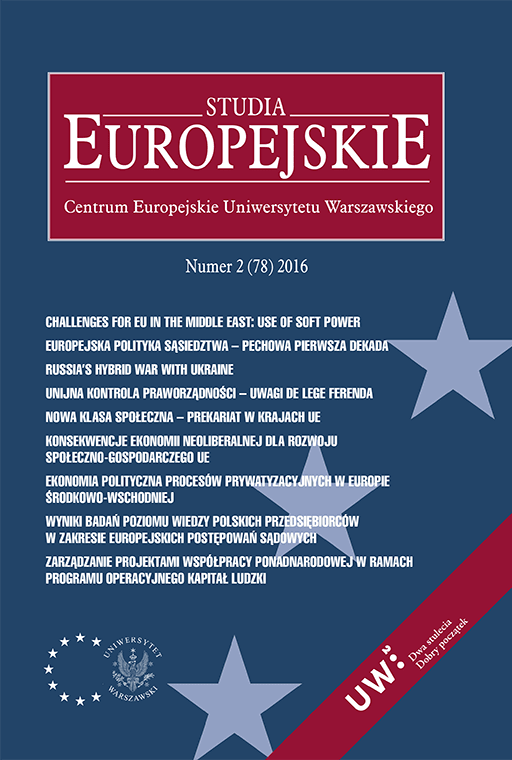
ISSUE: 2/2016
- Volume 78
- Number 2
- 2016
Subscribe NEWSLETTER
Studia Europejskie –
Studies in European Affairs
ISSN: 1428-149X
e-ISSN: 2719-3780
License
Articles published in the journal are under a Creative Commons Attribution – Non Commercial – No Derivatives 4.0 International License
Ekonomia polityczna procesów prywatyzacyjnych w Europie Środkowo-Wschodniej-próba podsumowania
Political Economy of the Privatisation Processes in Central and Eastern Europe – Summarising Attempt
Abstract
The objective of the paper is to investigate selected elements of the privtisation processes in Central and Eastern Europe. This vital part of economic policy played – in the transformation phase – a key role in shaping the new socio-economic order as well as it brought about a number of important implications (valid up to the present) in many spheres of life. Shifting from the centrally planned state economy to the free-market one based on the private property took place in CEE in the „heat” of neoliberal ideology. In this critical moment one could observe a redefinition of the relations between the market and the state, shifting the gravity point towards the more liberal solutions and the domination of market efficiency logic over the logic of the so called „public good”. Controversies over the methods, mechanisms and consequences (direct and indirect) of privatisation, especially the social ones, require advanced academic reflection.
References
Balcerowicz Leszek, Trzeba się bić. Opowieść biografi czna, Warszawa 2014.
Beveridge Ross, Naumann Matthias, Global Norms, Local Contestation: Privatisationa and De-politicisation in Berlin, „Policy and Politics”, Vol.
42, No. 2/2014, s. 275–291.
Bortolotti Bernardo, Fantini Marcella, Siniscalco Domenico, Privatisation Around the World: Evidence from Panel Data, „Journal of Public Economics”, Vol. 88(1–2)2003, s. 305–332.
Davidson Sinclair, Why is privatisation so controversial?, „Policy”, Vol. 30, No. 1, Autumn 2014, s. 18–22.
Katrougalos George, Constitutional Limitations of Privatisation inthe USA and Europe: A Theoretical and Comparative Perspective, „Constelations”,
Vol. 17, No. 3/2010, s. 407–425.
La Porta Rafael, Lopez-de-Sileanes Florencio, Sheifer Andrei, Government Ownership of Banks, „The Journal of Finance”, Vol. 57(1)2002, s. 265–301.
Pejovich Svetozar, On the Privation of „Stolen Goods” in Central and Eastern Europe, „The Indpendent Review”, Vol. X, No. 2, Fall 2005, s. 209–
229.
Illimar Ploom, Towards Neoliberal Imperialism? Discussing the Implications of the New European Governance Emerging from the Fiscal Crisis and Administrative Reforms for the Identity of the EU, “Administrative Culture”, Vol. 15(1)/2014, s. 21–38.
Reiners Marcus, International Liberalisation Policy. Political Scientifi c Factors Impacing the Proces of Denationalisation, „Journal of Comparative Politics”, Vol. 6, No. 2/2013, s. 63–81.
Riedel Rafał, Tranzytologia i konsolidologia – czyli jak zbadać poziom zaawansowania demokratyzacji systemu politycznego, „Przegląd Politologiczny”, nr 1/2008, s. 19–36.
Riedel Rafał, Demokratyczna bańka spekulacyjna… czy młode demokracje przetrwają kryzys gospodarczy? Refleksje na temat relacji demokracja – kapitalizm, w: Rada Europy a przemiany demokratyczne w państwach Europy Środkowo-Wschodniej w latach 1989–2009, red. J. Jaskiernia, Wydawnictwo Adam Marszałek, Toruń 2010, s. 706–717.
Rohac Dabor, Economic Transitions: Learning from Central Europe, „Policy Review”, October/November 2012, s. 69–79.
Scott Thomas, The Politics and Economics of Privatisation in Central and Eastrn Europe, „The Columbia Journal of World Business”, Spring 1993,
s. 168–178.
Grant Simon, Quiggin John, Public Investment and the Risk of Premium for Euity, „Economica”, No. 70(277)/2003.
Language: Polish
Pages: 111-125
How to Cite:
Harvard
Riedel, R. (2016) "Ekonomia polityczna procesów prywatyzacyjnych w Europie Środkowo-Wschodniej-próba podsumowania". Studia Europejskie – Studies in European Affairs, 2/2016, pp. 111-125.